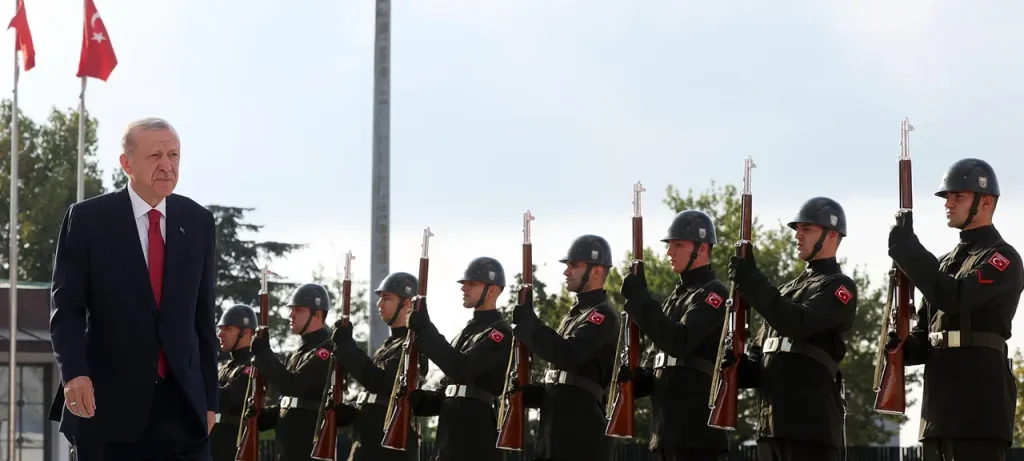The missile attack on the Golan Heights is fueling fears of the expansion of the war in the Middle East. Turkish President Erdogan has now brought military intervention into play – the response from Israel came immediately.
Turkish President Recep Tayyip Erdogan has threatened Israel with military intervention. “Just as we went into Nagorno-Karabakh, just as we went into Libya, we will do the same with them,” he said in reference to Israel during an event of his ruling AKP party in Rize on the Black Sea.
Erdogan was referring to the Nagorno-Karabakh conflict, where Erdogan supported the conflict party Azerbaijan with drones, among other things. In the civil war country of Libya, Ankara supports the internationally recognized government with military equipment and personnel.
Israeli Foreign Minister Israel Katz promptly warned the Turkish president: “Erdogan is following in the footsteps of Saddam Hussein and threatening to attack Israel. He should only remember what happened there and how it ended,” Katz wrote on Platform X.
In 2003, US troops invaded Iraq. The military operation led to the overthrow of the then Iraqi dictator Saddam Hussein. Three years later, Hussein was executed for massacres of Kurds and Shiites.
Since the beginning of the war, relations between Israel and Turkey have deteriorated drastically. Erdogan called Hamas a “liberation organization” and compared Israel’s Prime Minister Benjamin Netanyahu to Adolf Hitler.
In mid-July, Erdogan declared that his country would no longer agree to cooperation between NATO and partner Israel in the future until sustainable peace was established in the Palestinian territories. The Turkish leader’s recent threats are directly related to fears of a growing threat of war in the Middle East.
Hezbollah denies responsibility
On Saturday, a rocket hit the village of Majdal Shams on the Golan Heights, which is inhabited by Druze. At least twelve people aged 10 to 20 were killed. Israel and the United States blame the Shiite militia Hezbollah, which is allied with Iran, for the attack.
The Golan Heights are a strategically important rocky plateau. In the Six-Day War in 1967, the territory was conquered by Israel and annexed in 1981. However, this was not internationally recognised.
Hezbollah said in a statement that it had nothing to do with the attack. According to the US news portal Axios, the militia is said to have told the United Nations that an Israeli defensive missile caused the explosion.
Iran also blamed Israel itself for the attack in Majdal Shams. Israel’s Chief of Staff Herzi Halevi, on the other hand, said at the site of the impact that it was a Falak rocket of Hezbollah. UN representatives called on both sides to exercise “the greatest possible restraint”.
Just a few hours after the attack, Israel’s prime minister declared that the militant Islamist terrorist organization would pay a “high price” for the attack. The government is preparing for a retaliatory strike against Hezbollah in Lebanon.
After more than four hours of deliberations, the security cabinet authorized Prime Minister Netanyahu and Defense Minister Yoav Gallant “to decide on the manner and timing of action against the terrorist organization Hezbollah,” the prime minister’s office announced.
The Israeli military said it shot down a drone before dawn that had entered northern Israel from Lebanon. No injuries were reported. Earlier, Lebanese media were quoted in Israel, according to which there were air strikes in the south of Lebanon.
Among other things, there were Palestinian reports of heavy attacks from Houla during the night. The area has already been targeted several times by Israel’s air force in recent months. However, it was initially unclear whether this was Israel’s expected reaction to the rocket attack on the Golan.
There was initially no announcement from the Israeli military. The Israeli military had already attacked several targets in neighboring Lebanon after the rocket attack on the Golan Heights on Sunday night.
The Gaza war was triggered by the unprecedented massacre with 1,200 dead, which the Islamists of Hamas committed together with other groups from the Gaza Strip on October 7 of the previous year in southern Israel.

